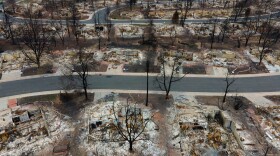-
“We’re not investing in new hires. We’re not investing in growth. Every tariff increase means the risk of losing my home."
-
An interview with Amy Gajda, author of Seek and Hide: The Tangled History of the Right to Privacy. The book is an important primer for today’s privacy wars - the surprising history of the right to privacy, and its battle against the public’s right to know.
-
It’s now legal again to give someone a ticket for sleeping or camping on public property.
-
The U.S. Supreme Court decided Thursday to send a lawsuit over Idaho's abortion ban back to the 9th Circuit Court of Appeals and said, for now, Idaho hospitals can perform abortions in medical emergencies.
-
On Monday, March 1, the U.S. Supreme Court released a unanimous decision that said that Colorado could not keep former president Donald Trump off of that state’s primary ballot.
-
Like many tribal leaders and advocates, Angel Charley of the Coalition to Stop Violence Against Native Women saw court challenges to the law as an attack on tribal sovereignty. She also says it was an opportunity for extractive industries to get a larger foothold on tribal lands.
-
Last month ProPublica reported on trips made by Clarence Thomas and whether the supreme court justice had properly disclosed them. The reporting raised questions about what kind of gifts Thomas and other justices can accept and raised questions about judicial reform.
-
The U.S. Supreme Court declined to weigh in late last month on a slew of lawsuits against oil companies filed by local municipalities – including three local governments in Colorado.
-
As the U.S. Supreme Court considers a challenge to the Indian Child Welfare Act, several states in the Mountain West are preparing their own laws to protect tribal rights should the court deem ICWA unconstitutional.
-
The U.S. Supreme Court was dubbed the least dangerous branch of government by Alexander Hamilton. But the court has lately been in the middle of some of America's biggest controversies.

Play Live Radio
Next Up:
0:00
0:00
Available On Air Stations










